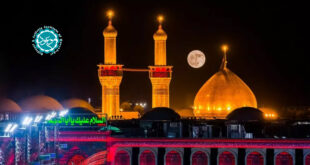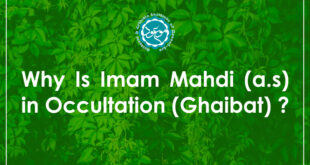As we all know, Fatima (SA) was deeply-grieved after the demise of her father and it is said that a large part of her pain was because her children were deprived of the love and care of the Prophet (SAW) and their grandfather. Sometimes she would talk to them with a painful heart, saying:
“Where has your grandfather who loved you so dearly gone? The grandfather who showered you with love and affection and carried you on his shoulders. Where has your grandfather who was the kindest to you, gone? He wouldn’t even allow you to walk on the ground and would carry you in his arms. Alas, I’ll never see you all on his shoulders again!” (Ibid.; Biharul-Anwar, vol. 43, p. 181)
Play & Activity
Although Islam emerged from an ignorant society, lacking in civilized culture, however the Message of the Prophet (SAW) and his Traditions that were forwarded through him and the Infallibles (AS) are suitable for the people of all cultures and civilizations, at any period of time, since Islam deals directly with the common innate nature of man.
Play and activity for children had a very special and important place in the methods of child-upbringing of Fatima (SA). Physical and mental activity and stimulation are so important for the healthy overall growth of a child that even adults should involve themselves wholeheartedly in these activities, in order to enthuse and encourage the child.
During childhood, play is the best way in which a child relates with his environment and leads to the surfacing of the latent aptitudes of the child. At the same time, it has very positive effects on the physical development of the child. Keeping these factors in mind, play and activity should never be neglected by parents or by the child.
It has been recorded that the Prophet (SAW) often involved himself wholeheartedly in play with his grandchildren. This shows that one of the very important tools of good parenting and positive upbringing of children is play and activity. Imam Ali (AS) and Fatima (SA) gave great attention to this childhood need and this was one of the secrets of the health and freshness of their children.
It has also been found that in homes where children do not have an environment where they can play and express themselves, the effects of such an environment are very negative on the children.
Fatima (SA) involved herself actively in play with her children, always attentive and alert to the fact that her words and actions would play a very determining role on the development of the characters and personalities of her children. This teaches us the importance of using healthy language and expressions in dealing with children. Hazrat Fatima (SA) used play as a very important tool in developing the bodies and souls of her children as well as enthused and inspired them into greatness and bravery through these entertaining activities.
It has been recorded that while playing with Imam Hassan (AS), Hazrat Fatima (SA) would swing him, reciting poems like:
“My Hassan, grow up to be like your father and do away with oppression on the way of the Truth. Worship Allah Who Bestows upon us countless blessings and never befriend oppressors.”
While play with Imam Hussain (AS), she would recite:
“You look just like my father (the Prophet) – you don’t look like your father (Ali).”
It is said that when Imam Ali (AS) heard these playful poems between Hazrat Fatima and her children, he would smile indulgently.
Our main purpose in glimpsing into the personal family-life of Fatima (SA) is to learn from her flawless and divinely inspired approaches in her inter-relationships within her immediate family as well as in society. We can see very clearly through studying her relationship with her father as well as her children that in spite of all the hardships, problems and pains this great family suffered at the hands of the cruel, ignorant people of their times, within of the family, always they shared very warm, affectionate and joyful times.
In the same way that the Prophet (SAW) used to put aside all his pains and concerns while he was with his beloved daughter Hazrat Fatima (SA), Fatima (SA) and Ali (AS) too, always made time to pay due attention to the different needs of their children. All of these very scientific methods played a very major role in bringing up their children as the bravest and most powerful people in human history. It is also important to note the importance of timing in child-upbringing because as we all know, Hazrat Fatima (SA) had a very few years with her children, but these were the most crucial years that shape a child’s personality. She played her role as a mother most perfectly and efficiently, leaving behind for the world a legacy of great and powerful heroes like Hassan (AS) and Hussain (AS) and Hazrat Zainab (SA) who in times to come, shook up the roots of oppression and tyranny.
Thus far, we have gained invaluable insights into the importance and benefits of healthy inter-family relations through studying the life of Hazrat Fatima (SA) and her role as a daughter and a mother. Continuing on this topic, in our following issue, we shall look into the personality of this great lady and her social relationships – insha’Allah.
The Personality of Hazrat Fatima (SA)
FATIMA (SA), the only daughter of the Prophet of Islam (SAW), was born in Mecca on 20th Jamadi ath Thani, 18 BH. The good and noble lady Hazrat Khadijah (SA) and the Apostle of Allah bestowed all their natural love, care and devotion on their lovable and only child Fatima (SA), who in her turn was extremely fond of her parents.
Fatima (SA) was very intelligent, accomplished and cheerful. She had inherited the genius and wisdom, determination and will-power, the piety and sanctity, the generosity and benevolence, the devotion and worship of Allah as well as other great qualities like self-sacrifice and hospitality, forbearance and patience, and the knowledge and nobility of disposition from her illustrious father, both in words and deeds. Her generosity and compassion for the poor was such that no destitute or beggar ever returned from her door unattended.
As a daughter, she loved her parents so much that she won their love and regard to such an extent that the Prophet (SAW) used to rise whenever she came near him. As a wife, she was deeply devoted to her husband, Ali (AS) and had never asked him for anything in her whole life.
As a mother, she cared for and brought up the most wonderful children who have left their marks in history that time will not be able to erase.
Fatima (SA) is acknowledged as `Sayyidatu-n-Nisa’i’l-alamin’ (the leader of all the women of the world for all times) because the Prophethood of Muhammad (SAW) would not have been everlasting without her. The Prophet (SAW) is the perfect example for men but could not be so for women. For all the Qur’anic verses revealed for women, Fatima (SA) has been the perfect model, who translated every Verse into action. In her lifetime, she was a complete woman, being daughter, wife and mother par excellence. ( M. H. Shakir, “A Brief History of the Fourteen Infallibles”, published by World Organization for Islamic Services, Tehran)
Fatima (SA), the Manifestation of Kindness and Self-sacrifice
The Tradition (Hadith) related below is said to be responsible for the revelation of the following Qur’anic verses:
“… and prefer (them) before themselves, though poverty may afflict them.” (59:9)
It is related that:
One day a poor, hungry man came to the Prophet (SAW) to ask for some food. The Prophet (SAW) guided him to go to the homes of his wives and get something to eat. All of them had no food in their homes and thus could not offer the poor man anything. He returned to the Prophet (SAW) who then asked his companions, “who is going to invite this guest to his home’? Ali (AS) immediately offered to take the man as his guest and soon they proceeded towards Ali’s (AS) home. On reaching home, Ali (AS) informed his wife Fatima (SA) that they had a guest and also enquired as to what they had at home for food. Fatima (SA) said that they had just enough food to feed the children, but that they would give priority to the poor guest. Ali (AS) then offered to turn off the lamp in the house, asking Fatima (SA) to put the children to bed. Ali (AS) thought of making the home dark so that their guest would not notice that his hosts had very little food and get embarrassed. Ali (AS) accompanied the guest on the dinner mat but the guest did not notice that Ali (AS) had not eaten, since the house was dark.
The night passed by in this manner. The guest ate comfortably and the members of Fatima’s (SA) home slept hungry.
It has been confirmed by numerous exegetes of the Qur’an that the Qur’anic verse mentioned above refers to the incident that demonstrated the kindness and self-sacrifice of Fatima (SA) and her family.
Hazrat Ali (AS) is quoted to have said:
“Once we were sitting with the Prophet (SAW) of Islam when he asked: `What is the best thing for a woman?’ No one could answer his question. I approached Fatima (SA) and discussed the issue with her and she immediately claimed to know the answer. According to her, the answer was, `The best thing for a woman is that she is protected from the sight of strangers such that neither does she have to see them nor do they get to see her.”
I returned to the Prophet (SAW) and gave him the answer. He asked at once, “Who taught you this answer?” I told him that the answer had come from Fatima (SA). The Prophet (SAW) was delighted and said: “Fatima (SA) is my flesh and blood.”
Numerous Traditions (Ahadith) have been related regarding the personality, dignity and responsibility of women. One Prophetic Tradition relates that once the Prophet (SAW) asked one of his companions, “When are women closest to Allah?” Again no one could answer this question. Fatima (SA) finally answered, saying: “When they are in their home.” According to exegetes, in all probability, this answer refers to a verse from the Qur’an that says:
“And stay in your home and do not display your finery like the displaying of the ignorant of yore…” (33:33)
It needs to be emphasized here that although in the Qur’an, this verse is addressed directly to the Prophet’s (SAW) wives, but it is also applicable to all Muslim women. In the same Chapter “The Allies”, Allah says:
“O Prophet! Say to your wives and your daughters and the women of the believers that they let down upon them their over-garments that they may be known, and thus they will not be given trouble; and Allah is Forgiving, the Merciful.” (33:59)
The above verse has discussed the philosophy of Hijab (Islamic dress code) for women, as a kind of protection for them from being followed, teased, disrespected and from evil and lustful eyes.
Islam considers the protection of the dignity and character of women for their happiness and sincerity. However, here we need to clarify that Islam does not advocate that women should never be allowed to see the light of the day. In fact, when we study the life of Fatima (SA), we find that she was very active in her personal and social life. At the same time, she was so careful in safeguarding her dignity and self-respect that in spite of her activities, she never intermingled with any strangers.
Not only has the presence of women not been prohibited in the areas of culture, politics, defense, etc. rather wherever necessary they are obliged to participate actively in these areas. For example, whenever the society requires the services of female doctors, nurses, teachers etc., the women in that society are obliged (wajib) to obtain the necessary skills and qualifications.
The sermons of Fatima (SA) in the Prophet’s Mosque (Medina), her serving alongside Imam Ali (AS) in the Holy Wars (Jihad) and during their migration from Mecca to Medina and also the roles played by her great daughter Zainab (SA) in the Battle of Karbala, followed by her famous speeches in Kufa and Sham – all these reflect on the active and powerful roles played by these great Islamic personalities.
Hazrat Fatima’s (SA) legacy to all the Muslim women of her ummah is purity of faith and character. Her vision for all Muslim women for all times to come is that they keep themselves chaste and pure like angels, as per Islamic values and ethics. One Prophetic Tradition says:
“The alms (zakat) of the beauty of a woman is her dignity and chastity.”
Thus, if a woman does not guard or protect her beauty and exhibits herself to strangers, neither does she attain salvation, nor does her husband experience peace of mind and spirit.
It is to be remembered here that Islam regards women like a beautiful and delicate flower that needs to be protected from hardships and dangers. Moreover because only if a woman is well-protected and well-secure, can she offer happiness and peace to her family and home and in this way only would the society be safe, secure and progressive.
May Allah guide all Muslim women to Fatima’s (SA) example – Ameen.
 Mouood Mouood English Edition
Mouood Mouood English Edition




